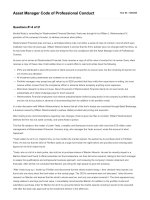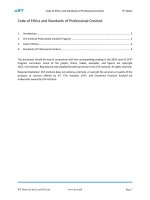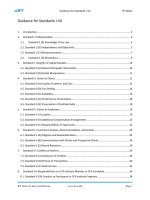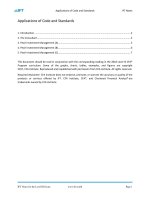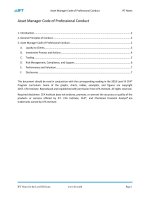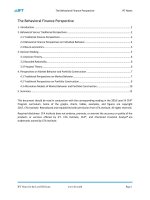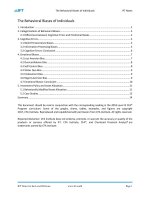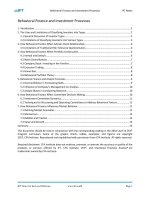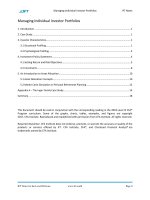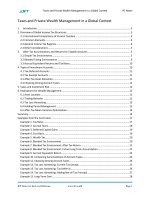CFA 2018 level 3 schweser practice exam CFA 2018 level 3 question bank CFA 2018 CFA 2018 r01 code of ethics and standards of professional conduct IFT notes
Bạn đang xem bản rút gọn của tài liệu. Xem và tải ngay bản đầy đủ của tài liệu tại đây (575.44 KB, 7 trang )
Code of Ethics and Standards of Professional Conduct
IFT Notes
Code of Ethics and Standards of Professional Conduct
1.
Introduction .......................................................................................................................................... 2
2.
CFA Institute Professional Conduct Program ........................................................................................ 2
3.
Code of Ethics........................................................................................................................................ 3
4.
Standards of Professional Conduct ....................................................................................................... 4
This document should be read in conjunction with the corresponding reading in the 2018 Level III CFA®
Program curriculum. Some of the graphs, charts, tables, examples, and figures are copyright
2017, CFA Institute. Reproduced and republished with permission from CFA Institute. All rights reserved.
Required disclaimer: CFA Institute does not endorse, promote, or warrant the accuracy or quality of the
products or services offered by IFT. CFA Institute, CFA®, and Chartered Financial Analyst® are
trademarks owned by CFA Institute.
IFT Notes for the Level III Exam
www.ift.world
Page 1
Code of Ethics and Standards of Professional Conduct
IFT Notes
1. Introduction
The laws governing the investment profession in every country differ. There are questions/situations
such as these that investment professionals deal with on a daily basis: Is it alright to engage in insider
trading if there are no strict laws against it in the country you reside/trade, unlike the U.S.? Is it
acceptable to buy shares for your own account before you buy for a client? What if a family member is a
client in your firm who pays fees just like any other client; should he/she be discriminated?
Several events (WorldCom, Enron) over the last decade that brought down companies, have put the
spotlight on the need for ethical behavior in the investment profession. The Code and Standards
stipulate rules and guidelines for CFA Institute members and candidates on how to conduct themselves
in a professional and ethical manner, with integrity, under all circumstances for the benefit of society.
Efficient, well-functioning capital markets help make the financial system more stable. For the capital
markets to be efficient, its market participants must be able to trust the market. What happens if they
don’t trust or believe, only a certain section of the market participants benefit from trades (let’s say due
to insider trading, nonpublic information, or malpractices). They will lose faith in the market and stay
away.
This reading is divided into the following sections:
CFA Institute Professional Conduct Program
Code of Ethics
Standards of Professional Conduct
2. CFA Institute Professional Conduct Program
All CFA Institute members and candidates enrolled in the CFA program are required to comply
with the Code and Standards. This includes you, assuming you are taking this course because
you have signed up for the exam, or because you are a member of the CFA Institute. If it is
applicable to you in the reading, it is applicable to any member or candidate.
Professional Conduct Program (PCP), in conjunction with the Disciplinary Review Committee
(DRC), is responsible for enforcement of the Code and Standards.
The DRC is a volunteer committee of CFA charter holders who serve on panels to review conduct
and partner with professional conduct staff to establish and review professional conduct
policies.
The CFA Institute Bylaws and Rules of Procedure for Professional Conduct (Rules of Procedure)
form the basic structure for enforcing the Code and Standards.
The inquiry can be prompted by several reasons:
Self-disclosure: On the annual Professional Conduct Statement, you disclose if you have
been a subject of civil litigation or criminal investigation.
Written complaints: If the PCP staff receives any written complaints.
Evidence of misconduct: Through media or any public source.
Report by a CFA exam proctor: If a candidate violated any rules on exam day and is reported
by the proctor.
IFT Notes for the Level III Exam
www.ift.world
Page 2
Code of Ethics and Standards of Professional Conduct
IFT Notes
CFA Institute may conduct analyses of scores and exam materials after the exam, as well as
monitor online and social media to detect disclosure of confidential exam information. For
instance, if a friend sits for the exam in Australia and discusses specific questions online
after the exam while you are in the United States where the exam hasn’t started, it can be
considered a violation of the Code and Standards.
Investigation: If the professional conduct staff believes a violation of the Code and Standards or testing
policies has occurred, the member or candidate has the opportunity to reject or accept any charges and
the proposed sanctions. There are two scenarios in case the PCP staff believes a violation has occurred:
member does not accept, the member accepts.
The member / candidate does not accept:
The matter is referred to the DRC, which reviews materials and presentations from professional conduct
staff and from the member or candidate. The panel’s task is to determine whether a violation of the
Code and Standards or testing policies has occurred and, if so, what sanction should be imposed.
Sanctions include: Public censure, suspension of membership and use of the CFA designation, and
revocation of the CFA charter. Candidates may be suspended or prohibited from further participation in
the CFA program.
If the member/candidate accepts the violation, then the sanctions will be imposed.
3. Code of Ethics
Who do the Code and Standards apply to?
Individual members of the CFA Institute; candidates in the CFA program.
It applies to firms who claim compliance with the CFA Institute Code of Ethics and Standards of
Professional Conduct.
The Code is primarily aimed at individual investment professionals. For firms, the Institute has
drafted the Asset Manager Code for asset managers specifying guidelines for six areas.
Note: The Code of Ethics is important and you must memorize it.
There are six components of the Code of Ethics. Members of the CFA Institute (including CFA charter
holders) and candidates for the CFA designation (“Members and candidates”) must:
1. Act with integrity, competence, diligence, and respect and in an ethical manner with the public,
clients, prospective clients, employers, employees, colleagues in the investment profession, and
other participants in the global capital markets.
2. Place the integrity of the investment profession and interests of clients above their own
personal interests.
3. Use reasonable care and exercise independent professional judgment when conducting
investment analysis, making investment recommendations, taking investment actions, and
engaging in other professional activities.
4. Practice and encourage others to practice in a professional and ethical manner that will reflect
credit on themselves and the profession.
IFT Notes for the Level III Exam
www.ift.world
Page 3
Code of Ethics and Standards of Professional Conduct
IFT Notes
5. Promote the integrity and viability of the global capital markets for the ultimate benefit of
society.
6. Maintain and improve their professional competence and strive to maintain and improve the
competence of other investment professionals.
4. Standards of Professional Conduct
There are seven Standards of Professional Conduct. Each standard has sub-sections. The standards are
covered in detail in the next reading.
Note: Memorize the standards and sub-standards.
I.
II.
III.
IV.
V.
VI.
VII.
Professionalism
Integrity of Capital Markets
Duties to Clients
Duties to Employers
Investment analysis, Recommendations, and Actions
Conflicts of Interest
Responsibilities as a CFA Institute Member, or CFA Candidate
Note: All the rules stated below are applicable to members and candidates. So it is not repeated before
stating every rule that “members and candidates must follow this….” “You” is used generically to refer to
members and candidates.
I.
Professionalism
A. Knowledge of the Law
Understand and comply with all laws, rules, and regulations of government, regulatory
organizations, and licensing agencies, governing their professional activities.
If there is a conflict of interest, adhere to the strict law, rule or regulation.
Do not knowingly participate or assist in activities that violate these laws, rules or
regulations. If you are part of a group where such violations are taking place, either make an
attempt to stop it, and if you can’t, then dissociate yourself from the activity.
B. Independence and Objectivity
Use reasonable care and judgment to achieve and maintain independence and objectivity in
all professional activities.
Do not offer, solicit, or accept any gift or compensation that could compromise your
independence and objectivity.
C. Misrepresentation
Do not knowingly make any misrepresentations relating to investment analysis,
recommendations, actions, or other professional activities.
D. Misconduct
Do not engage in any professional conduct involving dishonesty, fraud, or deceit that affects
IFT Notes for the Level III Exam
www.ift.world
Page 4
Code of Ethics and Standards of Professional Conduct
IFT Notes
your professional reputation, integrity, or competence.
II.
Integrity of Capital Markets
A. Material Nonpublic Information
If you possess material nonpublic information, ensure that you do not act or cause others to
act that could affect the value of an investment.
B. Market Manipulation
Do not engage in practices that distort prices or artificially inflate trading volume with the
intent to mislead market participants.
III.
Duties to Clients
A. Loyalty, prudence, and care
You have a duty to your clients and must act for the benefit of the clients. Interest of clients
should always take precedence before your own or your firm’s interests. Act with
reasonable care and exercise prudent judgment.
B. Fair Dealing
Deal fairly and objectively with all clients during all investment related and professional
activities such as analysis, recommendations, etc.
C. Suitability
If you are providing investment advice to a client then:
o Before making investment recommendations and taking investment action, ensure
you understand the client’s investment experience, return and risk objectives,
financial constraints, etc. Reassess and update this information periodically.
o Is the investment suitable to the client’s financial situation, and consistent with the
written objectives, mandates and constraints?
o Determine the suitability of investments in the portfolio as a whole.
If you are responsible for managing a portfolio to a specific strategy, style, or mandate, then
ensure the investment recommendations conform to the stated objectives and constraints.
D. Performance Presentation
Make reasonable efforts to ensure the investment performance information communicated
to clients/public is fair, accurate and complete.
E. Preservation of Confidentiality
Keep information about current, former and prospective clients confidential. Do not disclose
information unless it is required by law, or there is any illegal activity, or disclosure has been
permitted by the client.
IV.
Duties to Employers
IFT Notes for the Level III Exam
www.ift.world
Page 5
Code of Ethics and Standards of Professional Conduct
IFT Notes
A. Loyalty
Act for the benefit of your employer. Do not deprive your employer of the advantage of the
skills and abilities you possess; do not disclose confidential information, or cause harm to
your employer.
B. Additional Compensation Arrangements
Do not accept gifts, compensation, or consideration that may create a conflict of interest
with your employer’s interest unless you obtain written consent from all parties involved.
C. Responsibilities of Supervisors
If you are in a supervisory role, ensure that anyone subject to your supervision or authority
complies with applicable law, rules, regulations, and Code and Standards.
V.
Investment Analysis, Recommendations, and Actions
A. Diligence and Reasonable Basis
You must exercise diligence, independence, and thoroughness in analyzing investments,
making investment recommendations, and taking investment actions.
Support all your investment analysis, recommendation, and action with research. Have an
adequate and reasonable basis for all investment related activities.
B. Communication with Clients and Prospective Clients
Disclose to clients and prospective clients the basic format and investment processes you
follow to analyze investments, select securities, and construct portfolios. If there is a change
in the process, inform clients.
Disclose to clients and prospective clients any limitations and risks associated with the
process.
Use your judgment to decide what factors are important to investment analysis,
recommendations and actions. Communicate these factors to clients and prospective
clients.
Distinguish between fact and opinion in the presentation of investment analysis and
recommendations.
C. Record Retention
Maintain records to support investment analyses, recommendations, and actions, and
communications with clients and prospective clients.
VI.
Conflicts of Interest
A. Disclosure of Conflicts
Make full and fair disclosure of all matters that could reasonably be expected to impair your
independence and objectivity, or interfere with your duties to clients, prospective clients,
and employer. Ensure that such disclosures are prominent, in plain language, and
communicate the relevant information effectively.
IFT Notes for the Level III Exam
www.ift.world
Page 6
Code of Ethics and Standards of Professional Conduct
IFT Notes
B. Priority of Transactions
Give priority to investment transactions of clients and employers over yours.
C. Referral Fees
Disclose to employer, clients, and prospective clients any compensation or benefit received
from others for the recommendation of products or services.
VII.
Responsibilities as a CFA Institute Member or CFA Candidate
A. Conduct as participants in CFA Institute Programs
Do not engage in any conduct that compromises the reputation or integrity of the CFA
Institute, validity or security of the CFA institute programs, or the CFA designation.
B. Reference to CFA Institute, the CFA designation, and the CFA program
When referring to the CFA Institute, CFA Institute membership, the CFA designation or
candidacy in the CFA program, do not misrepresent or exaggerate the meaning or
implications of membership in CFA Institute, holding the CFA designation, or candidacy in
the CFA program.
Detailed guidance on the seven standards is provided in the next reading.
IFT Notes for the Level III Exam
www.ift.world
Page 7
